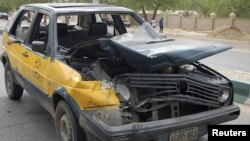ABUJA - For the second week in a row, Nigeria is reeling from church attacks that left several people dead, and scores more injured. Residents and clergy, both Muslim and Christian, are looking for ways to calm what appears to be a new wave of religious violence that is spiraling out of control.
In an open letter to the federal government released Tuesday, Jama’atu Nasril Islam, an umbrella group for Muslim organizations in Nigeria, condemned the recent church bombings in Jos and Biu that killed three people and wounded 41.
The group said the attacks were "barbaric," especially since they were carried out only a week after another deadly church bombing in Bauchi and a plane crash in Lagos killed more than 153 people. Jama’atu Nasril Islam called on the government to investigate claims of arms smuggling in Jos, which is known as a "flashpoint" city, nearly torn apart by more than a decade of deadly sectarian violence.
A spokesperson for the militant Islamist sect known as Boko Haram told reporters the group was responsible for the church bombings in all three cities, but the claims remain shrouded in mystery, with information coming through blocked phone lines and e-mails.
Shuaibu Bel, a pastor in Bauchi State, where a suicide bomber killed 15 people and injured at least 42 others last week, calls the attacks on Christians "incessant." He says they are a result of, among other things, ignorance and politics.
Political, religious and tribal leaders in Nigeria are often accused of hyping sectarian differences to cause conflict and garner power. Besides calling for prayer, Bel said leaders should support unity among the people.
"Your leadership should be without fear or favor," he said. "It should be for everybody. You are also a leader even for the blind or the destitute. You are also a leader for those who are wealthy and those who are poor."
Sectarian violence has plagued Nigeria for decades, long before Boko Haram was conceived. But Human Rights Watch says the group escalates tensions by what appear to be religiously motivated attacks. Boko Haram has been blamed for more than 1,000 deaths since it began violent operations in 2009, saying it wants to impose Sharia law and free imprisoned members.
The group has attacked churches, schools, marketplaces, media houses, police stations, government offices and the local United Nations headquarters.
Dalhat Hamid, an Islamic activist in Bauchi, blames the government for the growth of Boko Haram and the increased attacks, saying leaders have not taken enough action to protect the people or provide basic needs. He says poverty and desperation drive people to take up arms.
"The government has not been very proactive in addressing not only this issue of bombing, but there are so many socio-economic problems in the country that have not been addressed," said Hamid.
Hamid said dialogue among warring parties is essential to ending the crisis. After talks fell apart earlier this year, Boko Haram and the government both have said they are open to the possibility of resuming negotiations. It is not clear when or if this will happen.
Ardo Hazzad contributed to this report from Bauchi, Nigeria.
In an open letter to the federal government released Tuesday, Jama’atu Nasril Islam, an umbrella group for Muslim organizations in Nigeria, condemned the recent church bombings in Jos and Biu that killed three people and wounded 41.
The group said the attacks were "barbaric," especially since they were carried out only a week after another deadly church bombing in Bauchi and a plane crash in Lagos killed more than 153 people. Jama’atu Nasril Islam called on the government to investigate claims of arms smuggling in Jos, which is known as a "flashpoint" city, nearly torn apart by more than a decade of deadly sectarian violence.
A spokesperson for the militant Islamist sect known as Boko Haram told reporters the group was responsible for the church bombings in all three cities, but the claims remain shrouded in mystery, with information coming through blocked phone lines and e-mails.
Shuaibu Bel, a pastor in Bauchi State, where a suicide bomber killed 15 people and injured at least 42 others last week, calls the attacks on Christians "incessant." He says they are a result of, among other things, ignorance and politics.
Political, religious and tribal leaders in Nigeria are often accused of hyping sectarian differences to cause conflict and garner power. Besides calling for prayer, Bel said leaders should support unity among the people.
"Your leadership should be without fear or favor," he said. "It should be for everybody. You are also a leader even for the blind or the destitute. You are also a leader for those who are wealthy and those who are poor."
Sectarian violence has plagued Nigeria for decades, long before Boko Haram was conceived. But Human Rights Watch says the group escalates tensions by what appear to be religiously motivated attacks. Boko Haram has been blamed for more than 1,000 deaths since it began violent operations in 2009, saying it wants to impose Sharia law and free imprisoned members.
The group has attacked churches, schools, marketplaces, media houses, police stations, government offices and the local United Nations headquarters.
Dalhat Hamid, an Islamic activist in Bauchi, blames the government for the growth of Boko Haram and the increased attacks, saying leaders have not taken enough action to protect the people or provide basic needs. He says poverty and desperation drive people to take up arms.
"The government has not been very proactive in addressing not only this issue of bombing, but there are so many socio-economic problems in the country that have not been addressed," said Hamid.
Hamid said dialogue among warring parties is essential to ending the crisis. After talks fell apart earlier this year, Boko Haram and the government both have said they are open to the possibility of resuming negotiations. It is not clear when or if this will happen.
Ardo Hazzad contributed to this report from Bauchi, Nigeria.





